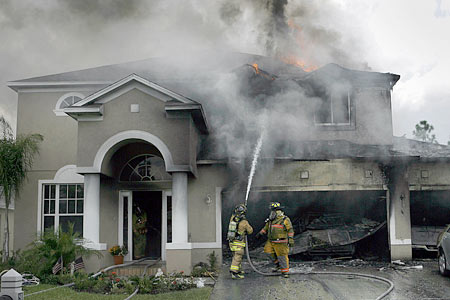 Lightning can cause fires, damage, injuries, and even death. Across the country, lightning causes about $400 million dollars in damage to property every year. While insurance policies typically cover lightning damage, insurance companies may attempt to deny or underpay claims. Lightning damage attorneys can help homeowners recover proper compensation for lightning damage.
Lightning can cause fires, damage, injuries, and even death. Across the country, lightning causes about $400 million dollars in damage to property every year. While insurance policies typically cover lightning damage, insurance companies may attempt to deny or underpay claims. Lightning damage attorneys can help homeowners recover proper compensation for lightning damage.
Types of Lightning Damage
Lightning can cause damage through direct strikes to the home or can strike trees and structures on the property. In some cases, trees and structures that have been struck by lightning will fall onto or ignite the home. When lightning strikes a home, it can cause malfunctions in the electrical systems and appliances throughout the home. The home may also start on fire, causing damage to property as well as structural damage.
When electrical systems are struck, lightning may cause damage to home appliances that are plugged in including:
- Washer and dryer
- Television
- Computer
- Phone
- Video game console
- Refrigerator
Lightning Damage in Florida
Lightning strikes much more often in central Florida than in any other area of the country. In central Florida, the number of lightning strikes can be calculated as roughly 12 strikes per square mile per year. These frequently occurring lightning strikes cause several fatalities and thousands of dollars worth of damage every year.
Documenting Lightning Damage
After lightning has caused damage to a home, it is important to document the damage sustained as quickly as possible. Taking photographs and listing any noticeable structural or property damage may help to discern the value of damage. After emergency services have contained the situation and filed reports, a copy of these reports should be obtained. This documentation may help insurance companies determine the amount to pay out. This documentation may also serve as evidence if an insurance company refuses to pay a reasonable amount and legal action must be pursued.
Lightning Damage Claims
Lightning damage is listed on most insurance policies as a covered peril. This means that any damage from lightning, including electrical damage or damage to property, should be covered. Injuries to home occupants may also be covered by homeowner’s insurance policies. When filing a claim, homeowners should submit documentation such as receipts or estimates for damaged appliances and structures. After filing a claim, the insurance company will typically send out representatives to investigate and document damage. Based on the investigators’ assessment and any provided documentation, a claim amount will be decided upon.
Lightning Damage Claim Denials
Insurance companies may deny lightning claims based on wording used in the insurance policy that excludes specific circumstances. Insurance companies may also deny lightning damage claims based on suspicion of arson. In some cases, these denials may be unethically orchestrated by insurance companies to avoid paying large claims.
Lightning Claim Underpayment
In many cases, insurance companies offer lightning damage claim payments that are insufficient to cover losses. This may occur when the insurance company disagrees with the damage repair methods and costs. A common example is the complete rewiring of a home that has had the electrical system compromised due to a lightning strike. Underpayment may also occur if the insurance company disagrees with the homeowner’s assessment of property value. It may be helpful to submit documentation such as repair quotes when filing the initial insurance claim.
Contesting Denied Claims
Lightning damage attorneys can help homeowners contest denied or underpaid claims. Lightning damage attorneys understand the tactics used by insurance companies to support claim denials and underpayments and will provide the advice and assistance that homeowners need to successfully recover costs. Attorneys may also help to speed claim processing for homeowners that feel the insurance company is intentionally delaying payment.
Punitive Damages
If it can be determined that an insurance company intentionally engaged in unethical tactics to deny lightning damage claims, the company may be required to pay punitive damages. Unethical tactics may include using vague wording in an insurance policy to intentionally mislead homeowners. Unethical tactics may also include delaying or denying claim payments without sufficient reason.
Sources:
“Lightning Detection.” NWA Page. National Weather Association, 29 Sept. 2014. Web. 25 Oct. 2014. <http://www.nwas.org/committees/rs/ltng.html>
“Lightning Facts.” Palm Beach County. Palm Beach County, 1 Jan. 2014. Web. 25 Oct. 2014. <http://www.pbcgov.com/dem/sections/planning/business/lightning/facts.htm>
“Lightning Basics.” NOAA National Severe Storms Laboratory. National Oceanic and Atmospheric Administration, 1 Jan. 2014. Web. 25 Oct. 2014. <http://www.nssl.noaa.gov/education/svrwx101/lightning/>
